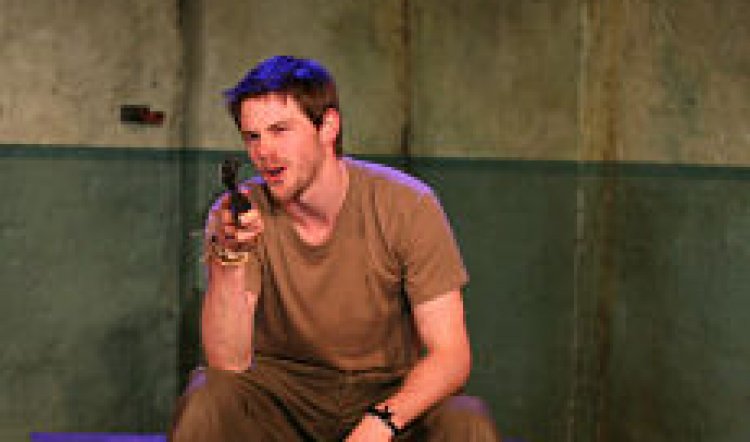
The Modern International Dead
The Modern International Dead SBW Stables Theatre, September 10-October 11, 2008; phone: 1300 306 776 or www.griffintheatre.com.au
The trouble with knowing something is that you can’t un-know it. The trouble with seeing something is that you can’t un-see it. This is where being a survivor of war and other catastrophes can turn out to be a devilish gift. It may also have been the origin of the idea that “ignorance is bliss.”
In Damien Millar’s new play The Modern International Dead an eclectic mob of ordinary Australians attempt to come to terms with their personal experiences of knowing and seeing. For various reasons that unfold during the course of the play, each has a connection with the worst excesses humankind has dreamed up over the past several decades: Cambodia, Rwanda, Iraq, East Timor … chemical weapons, genocide, landmines, civil war. You name it, they’ve seen it, either as weapons inspectors, soldiers, volunteers, de-miners, therapists or nuns.
They’ve also seen visions splendid – of Mary of Kibeho in Rwanda, Mary of the Seriously Ill-Fitting Habit and Mary of the Cynical Quip (all Colin Moody, by the way) – and visions dreadful. These are the kinds of pictures of which mellifluous TV news readers warn that the mildest versions they are about to flash up may upset or offend some viewers.
Thing is, it is precisely because we are so often protected from such images and knowledge – which no one should ever see, let alone have to suffer – that they continue. Ergo, ignorance is not blissful, and nor is it an excuse. Ignorance is certainly not an excuse in law and should not be when it comes to what goes on around the world either in our name or for our ultimate comfort.
The hectic, kaleidoscopic pace of the first half of Millar’s play means there’s little opportunity to mull over these thoughts, but they do gather in the back of the mind and come to the fore later: in the middle of the night. By this time you are well aware that, like it or not, you now know and have seen and therefore can’t un-know or un-see.
This may sound grim and, of course, it is: war of any kind is rarely a barrel of laughs; except when it is extremely, awfully, irresistibly, face-achingly hilarious. And The Modern International Dead captures that elusive element too. The humour – broad, sly and all destinations in between – takes it out of the pigeon-hole of the often earnest if enthralling “true story/verbatim theatre” and places it elsewhere.

The Modern International Dead is enthralling, for the most part, albeit too fragmented in the first half, and therefore rather confusing to get a handle on; and in the second half it’s hostage to the verbatim element – the research – and could do with a good hard edit. (In this respect it’s the playwright who has to try to un-know what he knows!) That said, this is a new play and its first outing and as such, it’s a considerable achievement. It is original, bold and theatrical and it takes no prisoners.
This is signalled from the outset as you walk up the stairs into designer Genevieve Blanchett’s grungy, public service issue eau de nil paint job. Teamed with Bernie Tan’s assorted strip and fluoro lighting effects and Nick Wishart’s sound design, the empty (one battered tin trunk) Stables auditorium – with its new second entry to the stage – effortlessly assumes the sounds and atmosphere of impersonal offices, ante rooms, hospital wards, broken down clinics, holding cells, cheap hotels and barracks anywhere in troubled parts of the world.
Director Chris Mead has made the most of the amazing opportunities offered by the simple addition of the extra entrance-exit way, and also his exceptional cast of three. Belinda McClory, Ian Meadows and Colin Moody take on a dizzying number of roles and work together with precision, pace and conviction. Moody and McClory are as good as they most often are – and as good as they can be when given material that affords them the chance to stretch and step out of familiar territory.
The revelation of the production is newcomer and WAAPA alumnus Ian Meadows. He shines in already luminous company and in truth is the heart and soul of the play. His intelligence and ability across a range of roles that might fox an old hand is a pleasure to watch; and the emotional truth and depth of his performance(s) are exceptional. Social and cultural barometer William Yang was in the audience on opening night and took care to capture Meadows in pixels afterwards, so it’s official: Ian Meadows’ star is born.



